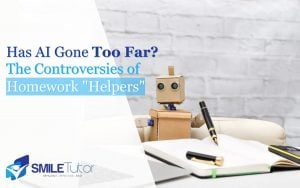
Remember the days where we laughed at the idea of robots taking over the world? Be surprised, the old Terminator movies are turning into reality!
Artificial Technology, or AI for short, has become more commonplace in society in recent years. The world is changing, and so has AI, as we find more and more ways to use it in our lives.
From healthcare to e-commerce among many others, AI has finally set its eyes on education. But WAIT, education? How do you “save time” on education? Well, have you heard of homework “helpers”? As the term defines it, we’ve now uncovered a way to automate the process of completing school work!
AI has now shown to be rather capable of handling work for students! In fact, you can finish your daily assignments within seconds!
So why the quotation marks? Wanna know what’s the catch?
Strap back your seat belts then, because you’re in for a wacky ride to learn more about the history of homework “helpers”!
- Origin: What are Homework “Helpers”?
- Evolution: The Rise of AI Homework Assistants
- Why Do Students Use Homework “Helpers”?
- The Ethical Dilemma: Cheating or Learning Aid?
- Downsides: Dangers of Misusing AI
- Upsides: The Right Way to Use AI
- Introspection: Moving Forward
- Conclusion: Dystopia or Pioneering the Future?
Origin: What are Homework “Helpers”?
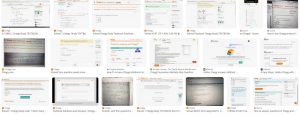
Before we talk about AI assistance in homework, we first have to talk about homework “helpers”.
So what are they?
Homework “helper” is a broad term that was widely defined as “answer banks”. If you had a question that you were stuck on, you used a homework “helper” to find the answer just by typing in the question under its platform.
Sites like Chegg offer a platform for these textbook solutions. In fact, if you did a quick Google search for one of your English questions right now, there’s a high chance that you’ll see the answers listed as one of the top search results!
As its reputation and reliability spread, homework “helpers” experienced rapid growth amidst a pool of controversy. They were called out as profiteers without morals because many believed that students were no longer learning if they simply copied the answers. Their infamy took off even more during the pandemic when all academics were taken to the digital space and it became harder to spot “cheating”.
But love it or hate it, “chegging” is so commonly used today that it’s passed off as a legitimate verb in the English language! It is also an open secret that Chegg and similar billion-dollar companies in the business of “homework help” get many of their answers by licensing directly from textbook publishers!
Evolution: The Rise of AI Homework Assistants
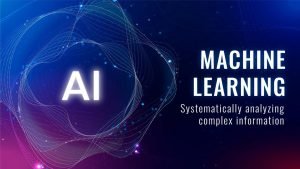
[Freepik]
So what changed?
As we’ve discussed earlier, AI became popular in the 21st century. Industries adapted to fit the strengths of AI into their work, cutting costs, raising work productivity, and catching mainstream attention around the world.
AI was good at machine learning: To learn and adapt, to the point where a random Joe like you and I could go online and ask it a question. Any question, and it will return you with a sensible and logical answer. Not limited to words, it could even produce images! You give it ten pictures of apples, and it will learn to create one of its own.
This feature of AI was discovered to be perfect for generating randomised and “original” content. What did this mean for homework “helpers”?
Homework “helpers” still held demand, but it received competition. You may have heard about this, but Chegg had also created their own AI chatbot CheggMate. They had to adapt to retain students whom they used to monopolise for homework assistance.
From “original” essays, to actual problem solvers, the AI would compute and create content for you. If you prompted it well, the AI could even explain its “thought process” for the given answers.
For thousand-word essays, prose was written in seconds!
When AI became good enough that it was almost indistinguishable from a person’s writing, it no longer mattered if a question was MCQ, or open-ended. These open-sourced AI chatbots had become genies in lamps! Besides granting you the wish of paying off all your student debts, it could do the homework for you instead!
No more overdue assignments! No more blanks in online exams! With AI, plagiarism as a concept became a grey area. After all, you weren’t technically drawing official answers like Chegg. The “answer” was completely “original”!
Why Do Students Use Homework “Helpers”?

[Freepik]
On the surface, the reasons you may choose to seek such unorthodox methods to complete your work are plain and simple: Grades and convenience.
There’s no sugarcoating the truth. Everyone wants good grades. We want it to be quick and easy. But we all know you don’t learn much just from copying answers! It doesn’t promote self-learning or thinking, as you skip the learning process entirely.
Yet, this doesn’t stop many students from using it. It is human nature when we find it hard to resist “cheating” when it’s harder to get caught. It’s the easy way out, and people WILL take the chance when they see it.
As Susan states on Forbes, “Chegg has weaponized the temptation and is cashing in on students’ worst instincts.” And more recently, AI has completely turned the idea of honest work over its head.
The Ethical Dilemma: Cheating or Learning Aid?

With the increasing availability of AI-powered learning platforms and tools, we now have instant access to a wide range of resources that can help us with our studies. However, this convenience raises an ethical issue, as these AI tools can be seen as both a good and bad thing.
Cheating: Academic Dishonesty
And so, to what extent can we consider the use of AI, cheating? Gone are the days where we keep notes in our sleeves. When everything is digital, the criteria for “cheating” becomes different.
“Whatever the AI produces, I’ll just take it word for word since it looks right.” You think to yourself. But this is a clear example of completing content with AI without understanding material. In other words? Plagiarism.
Some may argue semantics, claiming that using AI to do work is legal.
But in truth, many schools and universities have already banned the use of AI in academic papers. For obvious reasons, it is considered as a serious infringement of academic dishonesty.
After all, when you leave everything to AI, you do so with the awareness of giving up all autonomy in the learning and creating process. This clearly undermines the entire purpose of education!
Learning Aid: Supplement With Understanding
On the flip side, AI becomes more ethical when used sensibly.
Understand your own questions, or prompts that you feed the AI with. Ask with the intent to learn. Then, doubt its answers. Question and change them based on your own context, needs, sensibilities and understanding.
“I want to write to my friend, but the AI’s writing is too stiff. I should change the tone of the message but keep the points that the AI has raised.”
Under a similar thought process, this allows YOU to exercise human empathy to influence the end result. Remember that it is the process that humanises the use of AI.
Fear of Missing Out (FOMO)
Academics can feel like a rat race; we’re all struggling to get to the top.
Singapore is a meritocracy, so it’s not that surprising that everyone is competitive over grades.
But to gain that edge over others, many will turn to AI as a crutch.
“If I don’t use AI to write my essay, I’ll fall behind the others.”
“I can finish homework faster if I let AI do it for me, then I’ll have more time to play.”
In the foreseeable future, students will begin to reach similar conclusions as they feel the fear of missing out. As a result, it may feel like those who use AI to do homework, or even exams, are competing in studies on an uneven playing field. Not everyone has access to fully-functional AI, and it may disadvantage those who choose not to use it..
Despite this long-debated dilemma, we shouldn’t avoid AI completely. Why be afraid of something that is meant to help us? Instead, learn to adapt and understand the moral principles of AI as its uses continue to change.
Downsides: Dangers of Misusing AI

[Freepik]
The exposure of AI in education has already created ripple effects on students today. Many are unable to adapt to change, resulting in bad practices in their studies.
For one, the overreliance on technology is not to be discounted. When you become overly dependent on AI to give you answers, you potentially lose the opportunity to hone your critical thinking, problem-solving, and creativity.
Second, the answers that AI gives are not fully reliable. It does not understand context, nuances and cultural references when transcribing information for us. As such, taking the AI prompt’s results word for word may lead to issues like inaccuracy and bias in content.
Third, when crafting essays or long sentence structures, the AI can sound dry and generic. This is because AI lacks the most valuable skill in a good writer: Empathy! Without empathy, its writing can be easy to identify as AI-generated, no matter how professionally-sounding it may be!
Lastly, extended use of AI would inflate your grades, causing you to be unable to keep up. Homework and exams are crafted with the intent to assess your level in understanding of the curriculum. If you skip the step of fully understanding what you are learning, you will eventually find yourself at a wall.
Without the steady accumulation of knowledge, you’re more likely to draw blanks when it comes to year-end examinations. You will not have AI to help you when you’re sitting for a test in person!
Upsides: The Right Way to Use AI

[Freepik]
So when and how do we utilise AI in our studies?
Here’s a few ways you can use it right!
Generate Self-Study Content
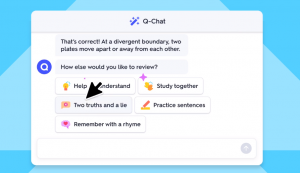
First, we have Q-Chat, Quizlet’s AI solution. While Quizlet continues its services as an answer bank, they have created a complimentary tool: An amazing chatbot that helps with self-revision!
So the traditional way of learning used to require you to read textbooks, right? And when exams draw near, your teachers give you revision notes and mock papers to test your understanding.
The class papers are only marked after the teacher goes through them in a day or two. But with AI, you skip the middleman! Well, teachers ARE still important. But during their absence, you can borrow a virtual tutor!
So what can students do with this digital assistant? Interactive learning!
With AI, you’re able to feed the AI a page of information, allowing it to come up with flashcards, MCQs, fill-in-the-blanks and more! We wouldn’t lie and say that studying would be fun just with the use of AI, but it does make it more manageable in between sessions!
During midterms and finals, this method of AI assistance gets even better! To prepare you well for important exams, your teachers will give you “cheat sheets”, containing most of the important information. Run it into the AI, and let it give you customised homework based on your learning objectives!
The perk of doing this, is that the AI will keep its deliverables short, sweet and to the point! For a student who’s serious in their studies, having a “second person” revise with you and ask you questions can often be a conducive way to motivate yourself to continue studying!
This is especially true when YOU are in control of what you want to learn. Prompt the AI on your lesson plan, and let it tailor questions and content based on your needs!
Personalised Feedback
AI is not just a way to create content. To a certain degree, it can also appraise the level of understanding where you’re at in your studies!
Something that would take a human a day to complete would be done in minutes, or even seconds by machine. And the AI makes use of this speed to assess your learning in real time.
As you finish tests produced by the AI, it will give you good feedback that you might’ve otherwise missed! Knowledge gaps and what needs improving or attention. It’ll truly feel like your teacher is online with you, burning the midnight oil!
Quality-of-Life Tools
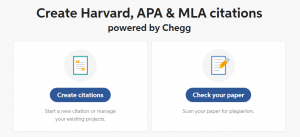
Beyond the capabilities of self-study, AI can also be properly used to a student’s benefit through plagiarism checkers like CiteThisForMe. Easing on the troublesome and manual citation process, you can immerse yourself fully in the human aspect of your work without worry!
Less time on monotone work, more time for your actual assignments!
Introspection: Moving Forward
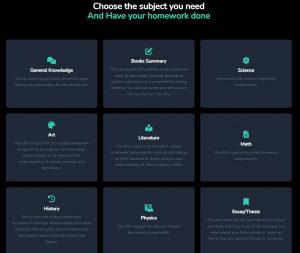
[thehomeworkai]
Whether you’re ready for it, AI will continue to improve and become integral to our lives. As we navigate our way through generations of technological advancements, we must also remind ourselves that artificial intelligence is just that. Artificial.
To avoid a decadent, downwards trend towards the educational standards of society, we have to take a proactive approach to understanding the permissible benefits and the taboos when using AI.
Educators and institutions should encourage responsible use of AI tools by clearly defining acceptable boundaries and providing guidelines to students. This is on our country leaders, as the future of education lies in good policies.
It is essential to foster a culture that prioritises the development of critical thinking skills and understanding of the subject matter. In doing so, AI tools will then be properly viewed as supplements to learning, rather than replacements for genuine effort and exploration.
Conclusion: Dystopia or Pioneering the Future?

[Disney/Wall-E]
To close off this article, we’d like for you to close your eyes and imagine.
It is a world of AI. Everyone uses AI for their living. Decisions are no longer handled by humans, as the AI predicts and schedules your itinerary for the entire day.
AI manages our food. AI manages our finances. AI manages our entertainment. And AI manages how smart we will need to be.
Would that be the future you want? To rest on our laurels and entrust our livelihoods to AI forever? Of course, we’re talking in the extremes here, but that’s the point we want to illustrate.
Never let AI be a complete substitute for human interaction and instruction. Because without that, we will lean to the far end of over-reliance. That is when AI has truly gone too far.
